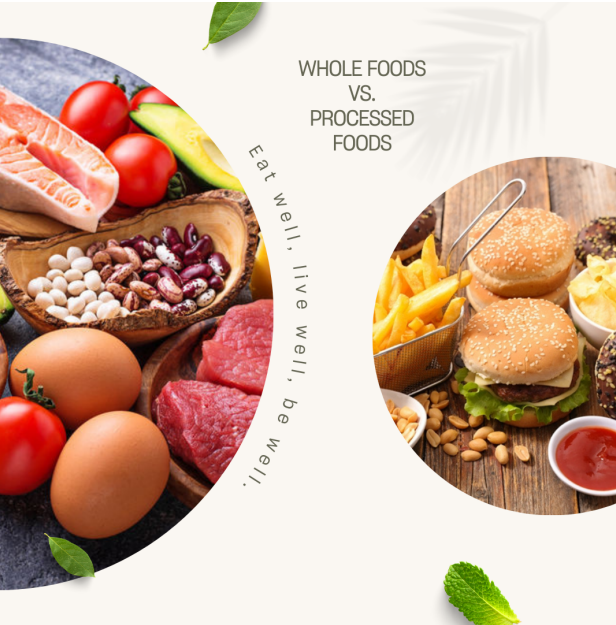In the pursuit of health and fitness, one truth remains constant: whole foods consistently outperform processed foods. But why? Let’s explore what makes whole foods superior and how they can support a healthier, more energized you.
What Are Whole Foods?
Whole foods are unaltered, natural foods like fresh vegetables, fruits, lean proteins, whole grains, nuts, and seeds. They’re free of artificial additives and retain their full spectrum of nutrients.
In contrast, processed foods are altered through manufacturing, often containing added sugars, unhealthy fats, excess salt, and artificial ingredients. While convenient, they lack the nourishment your body needs to perform optimally.
Why Choose Whole Foods?
- Nutrient Density
Whole foods are packed with essential vitamins, minerals, and antioxidants. They provide the nutrients your body needs to maintain overall health, support immunity, and reduce the risk of chronic diseases. - Sustained Energy
Unlike processed foods, which cause rapid spikes and crashes in blood sugar levels, whole foods deliver steady energy. Complex carbohydrates in whole grains, fruits, and vegetables release energy gradually, keeping you focused and alert throughout the day. - Weight Management
High in fibre and lower in calories, whole foods help you feel full and satisfied, reducing overeating. Their lower calorie density also makes it easier to maintain a healthy weight. - Improved Digestion
Fibre-rich whole foods promote healthy digestion, prevent constipation, and support nutrient absorption. A strong digestive system is crucial for overall well-being. - Better Heart Health
Whole foods, particularly those rich in omega-3 fatty acids (like fatty fish and flaxseeds), lower inflammation, support healthy cholesterol levels and reduce the risk of heart disease. - Enhanced Immunity
Nutrients like vitamin C, vitamin D, and zinc in whole foods strengthen your immune system, helping your body fight infections and illnesses. - Reduced Risk of Chronic Diseases
Studies link whole-food-based diets to lower risks of chronic conditions such as diabetes, cancer, and hypertension. Antioxidants and phytochemicals in whole foods play a protective role. - Healthier Skin
Your skin’s appearance reflects your internal health. Whole foods provide nutrients that nourish your skin, promoting a clear and vibrant complexion.
Take Action Today
Choosing whole foods isn’t just about satisfying hunger—it’s about fueling your body for success, health, and longevity. While processed foods offer short-term convenience, whole foods provide lasting benefits.
Start small. Swap out a processed snack for fresh fruit or add more whole grains to your meals. Track how these changes impact your energy, focus, and overall health.
Prioritize whole foods today to build a foundation for a healthier, stronger future. Your body will thank you.


